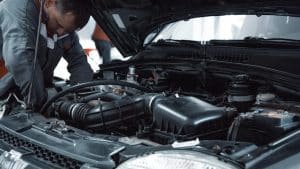The Impact of Your Driving Habits on Auto Body Repairs
 Maintaining good driving habits is not only important for your safety on the road, but it also has a direct impact on the condition of your vehicle. In this article, we will explore the connection between driving habits and the need for auto body repairs. By understanding how our actions behind the wheel can lead to accidents and damage, we can take steps to prevent costly repairs and keep our vehicles in top shape.
Maintaining good driving habits is not only important for your safety on the road, but it also has a direct impact on the condition of your vehicle. In this article, we will explore the connection between driving habits and the need for auto body repairs. By understanding how our actions behind the wheel can lead to accidents and damage, we can take steps to prevent costly repairs and keep our vehicles in top shape.
The Connection between Driving Habits and Auto Body Repairs
Aggressive driving is a leading cause of accidents and auto body damage. Speeding and tailgating, for example, increase the risk of collisions and can result in significant damage to your vehicle. Sudden lane changes and aggressive overtaking maneuvers also put you at risk of accidents that may require costly repairs.
Distracted driving is another common habit that can lead to auto body damage. Using your mobile phone while driving not only puts you and others in danger but also increases the likelihood of accidents and subsequent repairs. Other distractions such as eating or adjusting music can also divert your attention from the road and lead to accidents.
Drunk driving is not only illegal but also greatly increases the chances of accidents and the need for auto body repairs. Impaired judgment and decreased reaction time make it difficult to navigate the road safely, resulting in collisions that can cause extensive damage to your vehicle.
The Financial Impact of Driving Habits on Auto Body Repairs
Auto body repairs can be costly, and your driving habits can have a significant impact on your wallet. The expenses of parts and labor can quickly add up, especially if the damage is severe. Additionally, if you have a history of accidents due to poor driving habits, your insurance premiums may increase, further adding to the financial burden.
Furthermore, driving habits can affect the frequency of repairs. With poor habits such as aggressive driving, the likelihood of accidents increases, and consequently, the need for repairs becomes more frequent. This cycle can result in a continuous drain on your finances.
The Environmental Impact of Driving Habits on Auto Body Repairs
Auto body repairs not only have financial implications but also have environmental consequences. The energy and resources required for repairs contribute to carbon emissions and resource depletion. Additionally, damaged parts that are replaced during repairs contribute to waste generation.
Aggressive driving also has a negative impact on the environment. The excessive fuel consumption associated with aggressive driving contributes to air pollution and greenhouse gas emissions. By adopting responsible driving habits, we can reduce our carbon footprint and contribute to a cleaner environment.
The Importance of Developing Good Driving Habits
Developing good driving habits is crucial for preventing auto body repairs and ensuring our safety on the road. By adopting safe and responsible driving practices, we can significantly reduce the likelihood of accidents and subsequent repairs. Additionally, maintaining a clean driving record can lead to lower insurance premiums, saving us money in the long run.
To develop good driving habits, it’s important to follow traffic rules and speed limits. Staying focused on the road and avoiding distractions such as mobile phones or eating while driving can greatly improve our driving skills and reduce the risk of accidents.
Conclusion
In conclusion, our driving habits have a direct impact on the need for auto body repairs. By understanding the connection between our actions behind the wheel and the potential for accidents and damage, we can take steps to prevent costly repairs. Adopting safe and responsible driving habits not only keeps us and others safe on the road but also saves us money and helps protect the environment. Take a moment to reflect on your own driving habits and make positive changes that will benefit both you and your vehicle in the long run.
